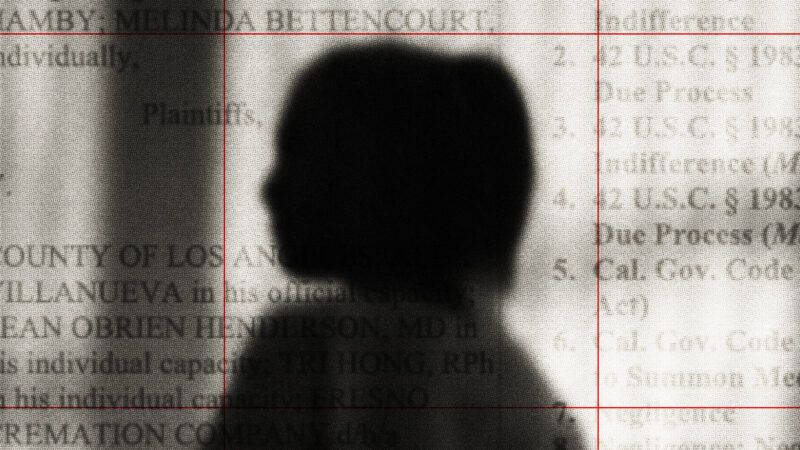A Los Angeles Jail Let a Woman Die of Withdrawal, Then a Coroner Allowed Her Body To Decompose
“I couldn’t believe it was my baby,” Amanda Bews' mother said. "She looked like she was mummified."

Amanda Bews was arrested last September after shoplifting from a Los Angeles-area liquor store. Within two days, she would be found unresponsive in a jail cell, dead from apparent alcohol and drug withdrawal.
According to a lawsuit filed this month, that wasn't the only way jail employees mishandled Bews' case. Not only did jail employees fail to treat Bews, despite numerous medical records stating she would need withdrawal medications, but once she had died, the jail mishandled her remains, leading to major decomposition that Bews' mother said made her daughter look "mummified"
After her arrest on September 7, Bews was first taken to a local hospital before booking, due to her admission of extremely heavy alcohol use and recent heroin use. According to the lawsuit, Bews told staff about her substance history and her drinking "just prior" to her arrest. Her arrest records state that she was a "prolonged heavy drinking."
When medical staff released her, they gave law enforcement medical documents that "would have included Amanda's history of alcohol dependence and heavy recent use," according to the lawsuit.
"In her ED Summary Report, the 'disposition' is listed as 'TO ACUTE CARE FACILITY,' indicating that Amanda should have received acute care (meaning consistent monitoring and inpatient treatment) at the jail she would be booked into," the complaint reads.
However, Bews didn't get this necessary treatment. Instead, she was placed into a shared cell during the afternoon of September 8th. Just after midnight on the 9th, the complaint says that staff cleared Bews "for detox and required no medications," and they "stopped treating Amanda for detoxification and withdrawal."
At 4:30 a.m., Bews was found unresponsive. Staff gave her a dose of Narcan, but she was pronounced dead at 5:29 a.m. According to an autopsy, the levels of drugs and alcohol in Bews' system were indicative of withdrawal and there was vomit in her airways.
"On information and belief, deputies also did not check on Amanda during this time, as her condition would have obviously deteriorated. Or, if deputies had, they failed to summon medical care during this time despite her deterioration."
After Bews' death, the lawsuit states that both the county medical examiner and Chapel of the Light, a private funeral home hired by the county, mishandled Bews' remains, leading to considerable decomposition of her body.
The coroners "failed to use the standard of care a reasonably careful person working at a medical examiner's office would use to handle human remains prior to transfer to their loved ones' family members. A reasonably careful employee of a medical examiner's office would at minimum properly refrigerate the remains," according to the complaint.
"Upon completion of the autopsy and transfer of the remains to Chapel of the Light, Amanda's remains had deteriorated significantly," the suit reads. "The County transferred custody of the remains to Chapel of the Light, but Chapel of the Light allowed Amanda's remains to further deteriorate."
According to The Los Angeles Times, photos of Bews show "A side-shot of a face so bloated with death it's gone flat. A close-up of skin, one patch bloodied and another so decayed it's turned gelatinous. Part of the nose is missing, and the features are bloated beyond recognition."
"I couldn't believe it was my baby," Melinda Bettencourt, Bews' mother, told the Times.
In all, the suit claims that the defendant's actions violated Bews' Fourteenth Amendment due process rights, as well as a failure to provide needed medical care and negligence.
"While Amanda was in their custody and care, Defendants had adequate time to reflect and reason prior to acting or failing to act. Because Amanda's health deteriorated over the span of more than a day, actual deliberation was practical," the suit claims. "Yet, Defendants' actions and omissions constituted objective deliberate indifference to Amanda's medical needs and unsafe conditions of confinement."


Show Comments (53)